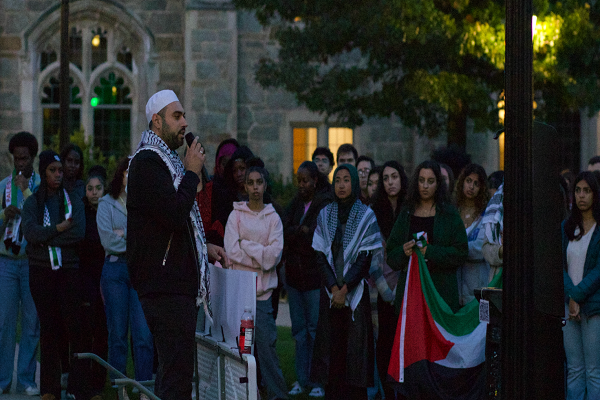AhlulBayt News Agency (ABNA): Muslim students at Boston College, a private Jesuit research university in Chestnut Hill, Massachusetts, hosted a prayer for the oppressed people of Palestine, especially the Gaza Strip, who are facing the Zionist regime’s brutal aggression.
Mahmoud El-Rifai asked a crowd of Boston College students, faculty, and student groups to reflect on the rising numbers of deaths in Gaza during the “Prayer for Palestine” event on Thursday night.
“They are just numbers to the majority of us,” said El-Rifai, the chaplain of BC’s Muslim Student Association (MSA) and a Palestinian refugee. “But they are not numbers. They are people with names, dreams, stories, and memories. We should not accept these numbers to keep increasing.”
The MSA hosted the event on the Quad, where the association’s president, Abdullah Sayed, welcomed members of MSA to speak for peaceful remembrance and prayer.
“As I look around, it is a blessing that we have so many people from our community here present today, all of whom I hope are praying for and remembering the lives and stories of the Palestinian people,” Sayed, MCAS ’24, said.
The vigil began with students reciting excerpts from the Quran, before El-Rifai read a prayer to the crowd.
“It’s just good to see so many unfamiliar faces,” said Omar Shaker, MSA executive spiritual coordinator and MCAS ’25. “I think we all stand for the same cause.”
Shaker recited verses 152 to 157 from the second chapter of the Quran, Surah Al-Baqarah, along with verse 185 from the third chapter of the Quran, Surah Ali Imran, in Arabic.
Hanan Sjah, MCAS ’25, then read lines 152 to 157 from Surah Al-Baqarah in English.
“‘O believers! Seek comfort in patience and prayer,’” Sjah read. “‘Allah is truly with those who are patient. Never say that those who died in the cause of Allah are dead.’”
El-Rifai shared his story of surviving three rocket strikes in Lebanon when he was 15 years old. He said he was on his way to his favorite spot—a small, old bridge—with a friend when they were thrown back by a large blast.
“At that day, at that moment, 15-year-old Mahmoud could have been another number on the news,” El-Rifai said. “Just an addition to the total numbers of those who lost their lives. … No one would have known anything about my story, my life, because I was just a number that just disappeared from this earth for a moment.”
According to El-Rifai, while it may appear that the conflict is far away from those at BC, the violence affects people all around the world. As an example, he referred to the recent killing of Wadea Al-Fayoume in the suburbs of Chicago. The 6-year-old child was stabbed 26 times during an attack prosecutors said was motivated by anti-Muslim hate, according to The New York Times.
“At that moment, what took place was dehumanization of Wadea,” El-Rifai said. “But every single time dehumanization takes place, the person who started this dehumanization loses their humanity as well.”
El-Rifai said humans should refuse to accept this hateful treatment of one another.
“As humans, we acknowledge we will have conflicts,” El-Rifai said. “We will have wars. But the one thing that we should never accept and allow to happen is for us to lose our humanity while we are in conflict.”
Attendee Omer Yurekli, MCAS ’26, said it is hard for him to stand back and watch the current suffering in Gaza.
“Like there’s not much I can do here, but even if one person were to walk by here who didn’t know anything and see us doing this, and get moved by that, that’s a win,” Yurekli said.
As the event ended, El-Rifai urged attendees to take action even if they believe nothing can be done to help the people of Gaza.
“Today, we might be watching the news, we might be bystanders to what’s happening,” El-Rifai said. “But we are the future. You will make the news in the future. You will make a difference in the future.”
.....................
End/ 257

